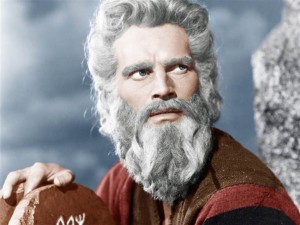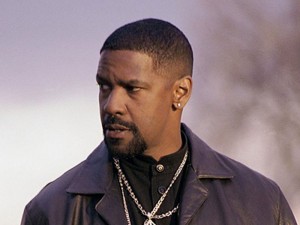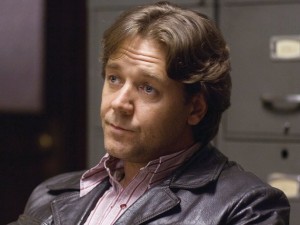By Steve Beard
2007, Breakpoint Worldview
The recent passing of Charlton Heston sparked a pretty intense childhood flashback from the 1970s, when I was able to stay up past my bedtime to watch The Ten Commandments on television. I was mesmerized with Charlton Heston, Yvonne De Carlo, Yul Brynner, Debra Paget, Edward G. Robinson, Anne Baxter, and Vincent Price. The Ten Commandments helped connect the dots in my young spiritual imagination. The story from Sunday school suddenly had a Middle Eastern landscape, a baritone voice, gaudy make-up, and far more dynamism than a flannel-board lesson.
 In working on Heston’s obituary, the Los Angeles Times unearthed an illuminating story it had published in 1956 titled “Moses Film Awes Portrayer: Actor Charlton Heston tells of drama in ‘Ten Commandments.’ ” In preparation for his role, he memorized lengthy passages from the Old Testament and persuaded director Cecil B. DeMille to allow him to portray the Mount Sinai scene barefooted, to add to the credibility of his role. “I stood on the ground where he stood, breathed the air he breathed, and was almost overwhelmed by the thought that here Moses became the only man in recorded history to meet God face to face,” Heston told the Times.
In working on Heston’s obituary, the Los Angeles Times unearthed an illuminating story it had published in 1956 titled “Moses Film Awes Portrayer: Actor Charlton Heston tells of drama in ‘Ten Commandments.’ ” In preparation for his role, he memorized lengthy passages from the Old Testament and persuaded director Cecil B. DeMille to allow him to portray the Mount Sinai scene barefooted, to add to the credibility of his role. “I stood on the ground where he stood, breathed the air he breathed, and was almost overwhelmed by the thought that here Moses became the only man in recorded history to meet God face to face,” Heston told the Times.
He confessed to the difficulty of portraying the humanity of Moses. “He had God’s thumbprint on his forehead, but because he was a man he must be comprehensible to other men,” Heston observed of his role. “I always work on the theory that the audience will believe you best if you believe yourself. This meant that I had to come to understand Moses well enough to believe in my portrayal of him.”
Over his illustrative career, Heston played many religious characters, including Michelangelo (The Agony and the Ecstacy), John the Baptist (The Greatest Story Ever Told), and Judah Ben-Hur (Ben-Hur). Of his many roles, he once joked, “I have played three presidents, three saints and two geniuses. If that doesn’t create an ego problem, nothing does.” Those who knew him best, however, report that he lived with great humility.
A life-long and faithful churchgoer, Heston immersed himself in the stories of Scripture. There was even a four-part documentary series produced titled Charlton Heston Presents the Bible, shot on location in the Holy Land as he read from the Scripture and discussed historical facts about biblical locations and events.
In his 1956 interview with the Times, Heston offered a profound analysis of the mechanics behind a spiritually transformed life. “It is interesting to note that once Moses climbs Mt. Sinai and talks to God there is never contentment for him again,” Heston observed. “That is the way it is with us. Once we talk to God, once we get his commission to us for our lives we cannot be again content. We are happier. We are busier. But we are not content because then we have a mission—a commission, rather.”
‘MY WORK IS MY MINISTRY’
Heston’s observations regarding contentment, happiness, and commission took on an interesting perspective as they relate to American Gangster co-stars Denzel Washington and Russell Crowe. Leaving analysis of the film to others, I became far more interested in the way the two Academy Award-winning actors view their craft and commission.
 Both men are considered to be in the top echelon of their profession, deeply respected as actors, and able to command top-dollar for their performances. Master and Commander, Training Day, A Beautiful Mind, Philadelphia, Gladiator, and Malcolm X are just a handful of Washington’s and Crowe’s noteworthy performances. Both of them literally stepped into the ring and took the body blows to play boxers in The Hurricane and Cinderella Man. Most recently, the two actors have become more outspoken about their spiritual lives.
Both men are considered to be in the top echelon of their profession, deeply respected as actors, and able to command top-dollar for their performances. Master and Commander, Training Day, A Beautiful Mind, Philadelphia, Gladiator, and Malcolm X are just a handful of Washington’s and Crowe’s noteworthy performances. Both of them literally stepped into the ring and took the body blows to play boxers in The Hurricane and Cinderella Man. Most recently, the two actors have become more outspoken about their spiritual lives.
Washington has been more well-known as a believer because of his long-time membership at the West Angeles Church of God in Christ—a megachurch in South Central Los Angeles. For the recent spectacular audio project “ The Bible Experience,” he and his wife, Pauletta, give voice to the Song of Solomon.
Washington ’s father was a Pentecostal preacher who simultaneously worked for the water company during the day and as a security guard at night. “I think every event in my life has been touched by God,” Washington confessed to Parade several years ago. “I remember sitting in my mother’s beauty parlor in New York on March 27, 1975, and in the mirror I kept seeing this woman looking at me.” He was a 20-year-old student at Fordham University at the time.
“I was doing so bad in school, and this woman said, ‘Somebody give me a piece of stationery! I’m having a prophecy!’ I still have that piece of paper. ‘You’re going to speak to millions of people,’ she said to me. ‘You’re going to do great things!’ And I thought, ‘Yeah, right. When’s that going to start? On Monday? I’m flunking out of school.’ ”
When he later asked his mother about the woman, she told him, “It’s Ruth Green, one of the elder sisters in the church, who’s been known to have the gift of prophecy.” He admits, “I didn’t think too much about it at the time, but that fall I started acting.”
As a young man, Washington found himself exploring Eastern philosophies and reading the Qur’an in his search for personal meaning and inner peace. In 1979, director Robert Townsend took him to West Angeles, and he found the spiritual sanctuary he had been looking for.
Washington was tempted to follow in his father’s footsteps and be a minister and even asked his pastor, Bishop Charles Blake, if he should become a preacher. Blake and Washington agreed that he was right where God wanted him. “So my work is my ministry,” he told BeliefNet. “I’ve always understood why I’ve been blessed to be put in this situation. And I’m more than happy to take advantage of it and to preach, if you will, about what God has done in my life.”
His stature within Hollywood gives him a certain degree of persuasive power regarding some aspects of his projects. For a film such as The Great Debaters—which he starred in and directed— Washington is outspoken about his use of prayer to help him make decisions. “Every major decision I made, I made through prayer, about who I was picking to be in it, what it was I was trying to say, praying that the film was saying the right thing and that it would reach the right people,” he said. Prayer is the way he begins and ends his day.
Portraying the corrupt policeman Alonzo Harris in Training Day is the role that landed Washington an Oscar, but it was also the film he warned Bishop Blake not to see. “Pastor, I don’t know if you will want to see this film,” Washington said. Nevertheless, there was a message he wanted to send in portraying the role.
“Even in a role like Training Day, the first thing I wrote on the script was, ‘The wages of sin is death,’ ” he told BeliefNet. “And it was important, actually, for me in making that film. They actually wanted the guy to live at the end. And I said no. I think the only way I could justify him living such an awful life, or living in the worst way, was for him to die in the worst way. I’m always looking for that—for some kind of a message.”
Washington sees himself on a spiritual quest and takes his prayer and devotional reading seriously. “I read the Bible every day,” he recently told Reader’s Digest. “I’m in my second pass-through now, in the Book of John. My pastor told me to start with the New Testament, so I did, maybe two years ago. Worked my way through it, then through the Old Testament. Now I’m back in the New Testament. It’s better the second time around.”
In addition to his Christian faith, Washington is also quite serious about defending his profession. When Reader’s Digest asked him, “Do you ever see a conflict in Hollywood, Godless Hollywood, as a spiritual person?” Washington was quick to respond: “Well, wait a minute. Stop. That’s broad. Godless Hollywood? What is that? First of all, Hollywood is a part of Los Angeles, not a way of thinking. When you say Godless Hollywood, are you including me? Are you saying everybody in Hollywood is Godless? That’s like saying Godless Reader’s Digest. No such thing, right?”
Hardly a tepid interviewee, Washington becomes feisty when he feels as though a bumper sticker characterization replaces more nuanced reasoning regarding faith and art. For him, instilling his creative endeavors with his faith is part of his commission. “It’s who I am. It goes with me wherever I go. Understand that it’s something bigger than making a film, even American Gangster,” he told BeliefNet. “When I met Frank Lucas [the drug kingpin the movie is based on], he said, ‘Do this and win an Oscar.’ I’m like, ‘Frank, I’m not in it for that.’ I found it interesting that he paid for his crimes with jail time, and now he’s paying with his body, which has sort of betrayed him. It’s important for me to tell that part of the story. There are consequences.”
‘I’M WILLING TO TAKE THAT LEAP OF FAITH’
Washington’s co-star in American Gangster, Russell Crowe, is not one that would likely end up on an Entertainment Weekly list of the deeply religious in Hollywood. Instead, he has the reputation of being a brilliant—albeit moody and short-tempered—actor who doesn’t suffer fools gladly. Nevertheless, he is a far more complex individual than the subjects of some of the pugnacious stories that end up on the gossip pages. When not working on a movie set, he is a devoted musician who has been playing in his band for more than 20 years, as well as a rancher who tends to several hundred Black Angus cattle. As a world-famous actor with a young family, he prefers his Australian acreage in Coffs Harbour to the bright lights of Hollywood.
 Crowe has a formidable intellect, a puritanical intensity toward his craft, and a probing spiritual curiosity. “Growing up, we always had this odd relationship with the church,” he confessed to actor Paul Giamatti a few years ago in Interview magazine. “Though we didn’t really go as a family, my mother was totally fine with the idea of me going to church on my own, so I’d go and have a look at a Catholic service or a Presbyterian service or an Anglican service. I went to a temple. The Bahá’i faith is something I looked at as well. Although I wasn’t brought up in a religious household, I’m a very inquisitive person about it, and, just the same as with my acting, I’ve taken things from various sources that mean something to me.”
Crowe has a formidable intellect, a puritanical intensity toward his craft, and a probing spiritual curiosity. “Growing up, we always had this odd relationship with the church,” he confessed to actor Paul Giamatti a few years ago in Interview magazine. “Though we didn’t really go as a family, my mother was totally fine with the idea of me going to church on my own, so I’d go and have a look at a Catholic service or a Presbyterian service or an Anglican service. I went to a temple. The Bahá’i faith is something I looked at as well. Although I wasn’t brought up in a religious household, I’m a very inquisitive person about it, and, just the same as with my acting, I’ve taken things from various sources that mean something to me.”
Crowe went on to say, “Finding a way of discussing what’s going on inside you is healthy, as is finding a way to forgive yourself for stupid [stuff] you do—and a way to acknowledge that you’ve done something stupid. If religion means anything to me, it’s about that.”
Last December, Crowe surprised observers with comments he made in Men’s Journal about a chapel he had built on his 1,400-acre Australian ranch north of Sydney. In an occasionally testy and contentious exchange with interviewer Allison Glock, Crowe was asked, “What is the most extravagant thing you’ve bought for yourself?”
Crowe responded, “Building the chapel on the farm where we got married.”
He was referring to a magnificent $400,000 dome sanctuary inspired by the kind of European skylines found in Paris and Rome. “I needed to convince Danielle [Spencer] we didn’t have to travel to Rome to get married like she’d always dreamed of, because I saw all the paperwork involved. So I had to manage that disappointment. I built her a Byzantine chapel of her own. It is consecrated and everything.”
Turns out that the dome was actually an addition to a small, rough-hewn chapel that Crowe had earlier built for personal reflection and contemplation. “In the long term,” Crowe said, “it isn’t really extravagant at all. Because we don’t have to travel to Rome to see where we got married. And we use it all the time.”
Crowe told Glock that, in addition to being the place where he married Danielle, the chapel was where his firstborn son Charlie was baptized—something Crowe never experienced at a young age. He then reported that when his second son Tennyson is baptized, “I will too.”
Glock was startled. “You plan to get baptized now, at 43?” she asked.
“I’d like to do it this year,” Crowe responded. “My mom and dad decided to let my brother and me make our own decisions about God when we got to the right age. I started thinking recently, If I believe it is important to baptize my kids, why not me?”
During the ritual of baptism, those participating are told that it is an “ outward and visible sign of an inward and spiritual grace,” which sounds remarkably similar to the kind of thing Crowe longs to signify.
“I do believe there are more important things than what is in the mind of a man,” Crowe said. “There is something much bigger that drives us all. I’m willing to take that leap of faith.”
Somehow you get the feeling that this was the kind of thing that was racing through Charlton Heston’s mind and soul when he stood barefooted on the set of The Ten Commandments—looking to the heavens for contentment and happiness in the midst of his commission.
Steve Beard is the creator and editor of Thunderstruck Media.
